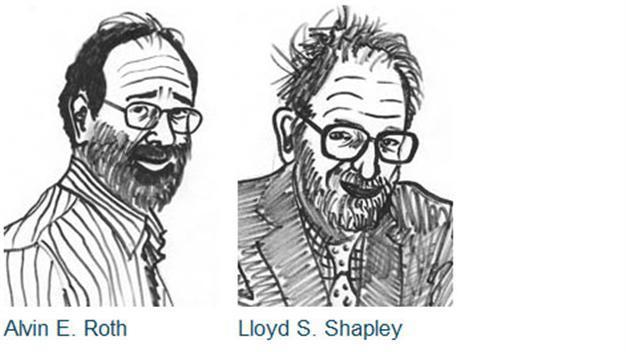US duo win Nobel Economics Prize for 'match-making'
STOCKHOLM - Agence France-Presse

Photo taken from http://www.nobelprize.org/nobel_prizes/economics/laureates/2012/
US scholars Alvin Roth and Lloyd Shapley won the Nobel Economics Prize on Monday for their work on the functioning of markets and how best to match supply and demand.
The work by Roth and Shapley helps match donors of human organs with patients in need of a transplant, or students with universities, or Internet search engines that auction out space for advertisers.
The two were honoured for "the theory of stable allocations and the practice of market design," the Royal Swedish Academy of Sciences, which picks the winner, said.
Resources are often allocated through a pricing mechanism: high oil prices give consumers an incentive to conserve energy, and high wages attract workers to a particular profession.
But in many markets, pricing is not enough to match different agents. Money is not the only factor that decides which hospital a doctor wants to work in, or which university would be best for a prospective student.
Central to their work is the idea of stability: the allocation where no individuals perceive any gains from further activity.
In a 1962 paper, Shapley applied the idea of stability to that of marriage, looking into how individuals in a group of people could be paired up despite their conflicting views on who would be their best match.
The best match-making was achieved by using what is now known as the Gale-Shapley "deferred acceptance" algorithm, a set of rules that aims to achieve a stable solution.
Roth and Shapley worked independently of each other but "the success of their research is due to the combination of Shapley's theoretical results with Roth's insights into their practical value," the committee said.
Roth, 60, is a professor at Harvard Business School in Boston, Massachusetts, while Shapley, 89, is a professor emeritus at the University of California.
Roth told public broadcaster Swedish Television he was surprised to win the award.
"No it wasn't expected. But it is certainly expected that Lloyd Shapley won the prize ... I'm glad to share it with him," he said.
Roth said he was pleased the prize would "shine a very bright spotlight on the work" he and Shapley had conducted in market design, "a newish area of economics and when I go to class this morning my students will pay more attention." The choice announced by the Academy confirms the US dominance in the Nobel Economics Prize. Of the 20 laureates who've won in the past 10 years, 17 are Americans, including two Israeli-Americans.
Roth and Shapley will receive the prize, consisting of a Nobel diploma, a gold medal and 8.0 million Swedish kronor ($1.2 million, 921,000 euros), at a ceremony in Stockholm on December 10, the anniversary of Swedish industrialist and prize creator Alfred Nobel's death.
Last year, the prize went to US researchers Thomas Sargent and Christopher Sims for research on the causal relationship between economic policy and different macroeconomic variables, such as GDP, inflation, employment and investments.
Monday's economics prize wraps up the 2012 Nobel season.
Last week, the Nobel Peace Prize, perhaps the most-watched of the Nobels, was awarded to the European Union for bringing more than half a century of peace to a continent ripped apart by two world wars, a choice met by both praise and ridicule.
The awarding of the Nobel Literature Prize to Chinese writer Mo Yan also sparked controversy, with Chinese dissidents accusing him of being a communist stooge.
The awards for medicine, physics and chemistry were also awarded last week.
